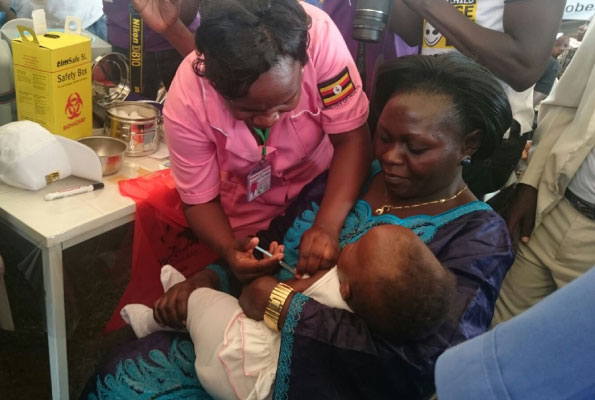Right from the earliest days of the NRM government, the health of the population ranked high on the priority agenda, especially the communicable diseases. The government identified six killer diseases; polio, measles, whooping cough, diarrhea, dysentery, and malaria that were responsible for the high mortality rate in the country. In order to reverse the worrying trend, the government with its partners like the World Health Organization and GAVI embarked on a countrywide immunization drive. The move gained international acclaim as a success story in Sub-Saharan Africa, in fact at some point, Uganda was declared a measles free country as a result of this mean feat.
However, the mass immunization drive was a double-edged sword given that it reduced the mortality rate but also led to a population explosion now that the chances of children dying were immensely reduced. The increased population brought up other social challenges, for instance, pressures on social amenities like hospitals, housing, nutrition and schools. However, this achievement has not been achieved on a roller coaster ride, but rather with a lot of challenges both social and logistical nightmares. Logistically, this massive exercise requires comprehensive plans that involve both the technical staff and society. Whereas the logistics could be in place, the society must accept the exercise and own it. Failure to strike that balance renders the whole exercise a futile venture.
The question is why have these mass immunization drives faced a lot of jitters amongst the society, who are supposed to be beneficiaries from this noble act. Why is it that authorities have been compelled to use force to immunize the children? The biggest problem has been the unsubstantiated rumors about the vaccines and the inability of government to dispel the rumours through effective communication to the wavering minds of the jittery public.
Several questions have been raised by the public concerning the safety and efficacy of the vaccines. Little has been done to dispel the fears about the safety given that there have been long-standing murmurs that these vaccines are brought to control fertility rates of “blacks”. The matters have not been helped by the contradictions that surfaced during the hepatitis B vaccine scandal. These are things that must be smoothered right from the planning stage.
There are lingering questions in the minds of the suspecting public, for instance, if a child of 15 years has had several polio or measles shots right from year one, maybe twice or thrice, why would it be that the same child is required to have another shot now. This causes a lot of jitters, does it mean that the previous vaccinations had no effect or does it require several rounds of immunizations for a child to be safe? Does that mean that the vaccines are not effective? It is true these are communicable diseases that are being spread across borders mainly by refugees, but refugees are a permanent feature in our societies, as long as conflicts exist they will always stream into the country.
So is there a permanent solution to Ugandans who have been vaccinating since childhood till 15 years or it is an indictment that the vaccine is not effective regardless of how many times you take the shots. The problem with this question is that it cuts across the social strata, irrespective of the education level or economic status. It remains a disturbing conundrum for the authorities to effectively explain.
The religious beliefs have also raised issues that need to be addressed by theologians. Religion thrives on dogma, to change a dogmatic mindset, it must be done by those who understand and appreciate the scriptures. The task of the authorities should be how to co-opt religious institutions in the plan rather than a forceful approach like the Luwero arrests. The different interpretations have to be appreciated to make it seamless for believers to partake in the exercise.
The biggest dilemma is that the rank and file of the believers don’t have the capacity to read and internalize the scriptures and even those who seem to understand the scriptures like Prophet Elvis Mbonye have waged war on immunization quoting biblical verses. There should be synergy created to create a link between the scriptures and reality obtaining on the ground.
Schools are the biggest custodians of children in the immunizable bracket, the ministries of education and health should have created a working relationship which mandates all enrolled children to have an immunization card. This greatly captures a large number of children under their care. Schools should be a catchment area for immunization as a directive that is not negotiable and this stand should be communicated to parents beforehand.
It is true that the mortality rate has drastically reduced, but this reduction is a function of varying interventions like improvement in public health systems, improved living standards in form of housing, diet, and medical care.
The task for the ministry is how to explain to parents whose children have not been immunized but they have not had any major health attack. They argue that despite not immunizing their children, they are healthy, immunization is useless. The explanation should be that opportunistic diseases take advantage of our environment, but living in a good environment at home doesn’t mean that there won’t be interactions with other children from other environments that may not be as good, thus contracting diseases.
This explanation needs a sustained sensitization campaign involving all leadership structures to the lowest unit.
The political opposition has not helped the situation by bad-mouthing the exercise citing incidents of expired drugs. Any statement made by a leader is taken seriously by the subjects, so the government should find a nexus between political rhetoric and reality.
The more there is lack of convergence, the more failure is eminent. The cycle of immunization will continue if our refugee policy doesn’t strictly stress immunization and public health programs. It should be a condition for offering a refugee status to first immunize at the point of entry and registration.




